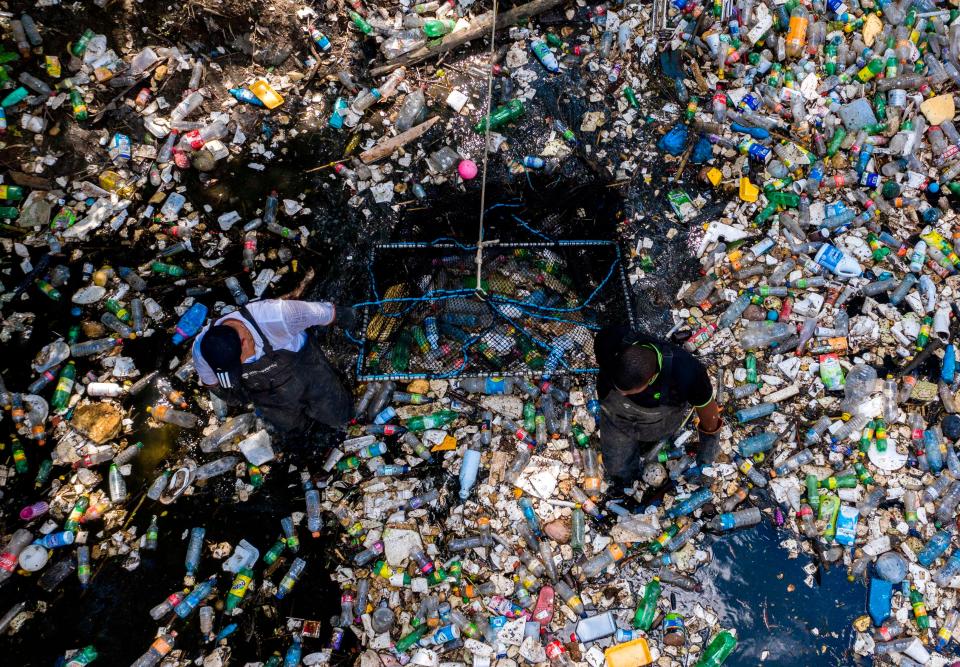Coke, Dr Pepper, Pepsi execs: We are committed to reducing plastic waste
Americans love beverages and all the choices they have. They also like the convenience of the plastic bottles that many beverages come in. What they don’t like is where a lot of these bottles end up.
The nonalcoholic beverage industry produces about 100 billion plastic beverage bottles every year for U.S. consumers. About 30 billion of those bottles are recycled for reuse. The rest end up in a landfill or as litter. This is a waste of much-needed recyclable material that was designed to be repurposed.
Our companies have sought to tackle this issue individually for years. Separately, we joined with sustainability groups to reduce our impacts on the environment. We’ve worked directly with community leaders to improve recycling systems. We’ve invested in the expansion of curbside and public recycling bins.
Yet the problem of plastic bottles being in places they shouldn’t be has persisted. We realized the issue was bigger than any one company.
We want the best for our customers in everything we do
Ours is an extremely competitive industry. A glance at the creative ways we advertise the variety of choices on grocery shelves shows how we try to do our best every day to win customers from each other.
In 2018, our three companies, and our trade association, the American Beverage Association, began work on a plan to improve the collection, recycling and reclaiming of our bottles. We believe that by harnessing together the power of our three companies, we could reduce our reliance on new plastic and keep our plastic bottles out of the environment.
Recently, we launched an industrywide effort with the country’s leading advocates for conservation and recycling to reduce our need for new plastic by working to collect, recycle and remake plastic bottles from the plastic bottles we already produce.
Our bottles are already designed to be 100% recyclable so they can be remade into new bottles. The plastic we use in our bottles is used to make a variety of consumer products and is in high demand across many industries. All of us are eager to get the plastic back through improved recycling. When recycled appropriately, our bottles can be made into new bottles.
A myth of a crisis: You shouldn't feel guilty about your plastic trash
Our companies are committing $100 million to invest in upgrades to recycling infrastructure and education with Closed Loop Partners and The Recycling Partnership. These organizations will leverage our investment to generate nearly half a billion dollars in support for these programs. Through our combined investments, the organizations will zero in on targeted regions of the country where the best opportunities exist to drive increased collection of recyclable plastic, for use in new bottles.
Our conservation plan
Closed Loop Partners, the leading investment firm in sustainability, will manage upgrades to recycling infrastructure and fund upgrades to equipment at material recovery systems with the latest optical scanners that can increase the amount of recycled plastic for reuse. The fund will also be used to help businesses that turn recycled bottles into plastic pellets for reuse in many products.

The Recycling Partnership will conduct intensive educational and promotional efforts to expand the reach of recycling in communities and help educate residents on how to recycle better. They will work neighborhood by neighborhood to notify people about how to avoid contaminating recyclables.
Finally, World Wildlife Fund will measure the success of this effort through their ReSource: Plastic initiative and help our companies use less new plastic. They will provide accountability and transparency that our industry is working to meet its commitments to protect and conserve the environment.
You can't save the planet by going vegan: Corporate polluters must be held accountable.
This is the first time these environmental and sustainability leaders will work together with an entire industry to address this urgent issue.
On its own, Every Bottle Back is not going to solve the global problem of plastic in the environment. But for American beverage companies, this effort is demonstrative of what increased focus and collaboration can do. It’s our hope that Every Bottle Back becomes a catalyst for future investment and a model that can be replicated elsewhere. In demonstrating the value of our bottles, we hope to unlock the economic potential of all recyclable materials as a future resource for new packaging that can support our society and reduce our impact on the environment.
Jim Dinkins is president of Coca-Cola North America, The Coca-Cola Co. Derek Hopkins is chief commercial officer of Keurig Dr Pepper. Kirk Tanner is chief executive officer of PepsiCo Beverages North America.Follow the American Beverage Association on Twitter: @AmeriBev
You can read diverse opinions from our Board of Contributors and other writers on the Opinion front page, on Twitter @usatodayopinion and in our daily Opinion newsletter. To respond to a column, submit a comment to letters@usatoday.com.
This article originally appeared on USA TODAY: Coke, Dr Pepper, Pepsi executives: Please, recycle your plastics

